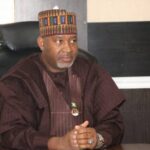
The Director General of the Nigerian Meteorological Agency (NiMET) Prof. Mansur Matazu has said the agency has improved significantly in accurate weather prediction, which has enhanced activities in agriculture and transport industries in the country.
Speaking on “Climate Issues, Opportunities and Solutions in Nigeria”, at the British High Commission, Nigeria hosted by Youth Consultation on Climate Change and Nationally Determined Contributions, Prof Matazu explained that the agency has built infrastructure, developed competencies for effective service delivery of its services in accordance to international and standard practices.
Matazu stressed that government alone cannot carry out the meteorological activities in the country, hence the need for effective collaborative and partnerships.
Integration of meteorological information into planning and implementation of development programs were strategies for managing weather-related risks in all sectors of the economy.
“Effective Collaboration with MDAs, State Governments, NGOs, Universities and Research Institutions on sustainable strategies to reduce the effects of climate change in Nigeria. These collaborative partnerships will only be sustainable with youths as Climate Actors and integral PART of the solution”
“These NiMet services are key instrument to reduce effects of changing climate and restore the degrading ecosystem in the country. NiMet, as part of our statutory responsibility will continue to provide meteorological early warning system, identifying severe weather events related to climate change valuable,” he said.
Matazu explained that the agency embarked on making regular weather and climate predictions to help the public mitigate effects of climate change by way of Early Warning Systems (EWSs) and regular assessment of impacts of climate change
Matazu also explained that the agency also embarked on regular assessment of climate change and its impacts on the socio-economy activities of the country, through publications.
Such publications according to Matazu, include climate review bulletins (now State of the Climate in Nigeria), agromet decadal review bulletins, drought, and flood bulletins, among others
He also disclosed that such publications strengthens organs of government, assists government by giving proper and timely advice to in formulation of policies that would help government mitigate the effects of climate change.
According to Prof Matazu, in the past 150–200 years, considerable changes have taken place in the composition of atmospheric gases due to natural processes and human activities, such as increasing energy consumption, industrialization, intensive agricultural practices, urbanisation and rural development, etc which has led to rise in global temperature and high spatial and temporal variability.
He remarked that the changing temperature regime has resulted in considerable changes in the precipitation (rainfall) pattern and a changing climate will result in considerable changes in natural vegetation and in land use practices
Matazu revealed that in the last decade, 2011-2020, was the warmest on record with rising global temperatures contributing to more frequent and severe extreme weather events around the world, including cold and heat waves, floods, droughts, wildfires, and storms stressing that around 90 per cent of the excess energy that accumulated in the earth system due to increasing concentrations of greenhouse gases went into the ocean.






